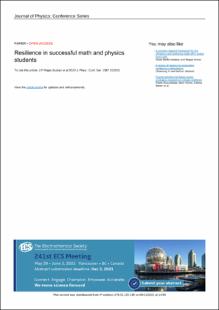Resilience in successful math and physics students
Artículo de revista
2020-08-05
Journal of Physics: Conference Series
Resilience refers to the student's ability to overcome emotional periods caused by adverse situations. In this sense, research aims to evaluate the relationship between academic performance in mathematics and physics and school success in higher education students. The research is framed within a quantitative, descriptive-comparative and micro-sociological methodological approach developed with data from primary sources. Data collection was transectional and the sample was 1500 students. The Wagnild and Young resilience scale was used. The results show that there is an important relationship between the level of demand, the application of mathematics and physics, abstraction and academic performance. Students develop emotional resilience skills that allow them to improve their quality of life. In conclusion, resilience is significantly related to all strengths of character, as well as to positive acceptance of change and personal competence. It was identified that, while resilience helps students to be more tolerant and to better understand what is happening in their environment, it is precisely in these challenges that the strengths of high educational performance are manifested. Successful students demonstrate skills in formal thinking, creative thinking, applying mathematics, physics and resilience, all of which impact on their quality of life.
Descripción:
Resilience in successful math and physics students.pdf
Título: Resilience in successful math and physics students.pdf
Tamaño: 506.9Kb
 PDF
PDF
 LEER EN FLIP
LEER EN FLIP
Título: Resilience in successful math and physics students.pdf
Tamaño: 506.9Kb
 PDF
PDF
 LEER EN FLIP
LEER EN FLIP















